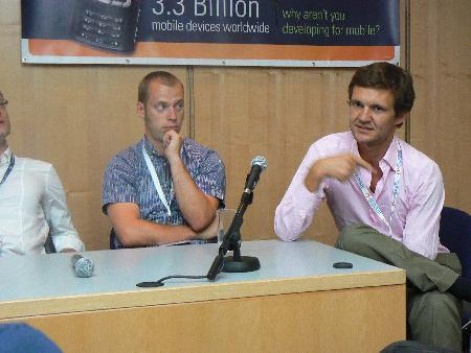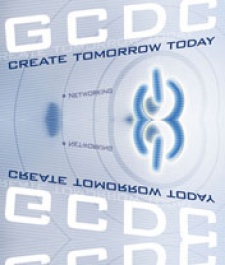To be honest, looking at that panel line-up, they're hardly going to say, 'No, there's no future for off-deck distribution.'
Anyway, Ahnegard speaks first, stressing Sony Ericsson's commitment to selling mobile games. Malaperiman says it's certainly possible to move forwards in off-deck distribution, but that it'll still be dependent on the operators for billing, for example.

Schade now, from a publisher's point of view. "We hope there's a future for off-portal distribution," he says. Fishlabs generated 40,000 active gamers for its new Rally Master Pro mobile game by distributing a free version through pirate sites they got to play on a couple of tracks, but then had to pay to download more. "In the first few months, we generated 2.2 million track downloads," he says.
Richter now: "You can't do without them [the operators] but we all want a larger piece of the cake."
Now Castelli, who talks about an off-portal mobile games service in Japan, Mobage-town, which launched in February 2006 the first time free games had been offered in Japan, with an avatar and social networking features wrapped around it. It's since been a huge success, with one teenager in four registered to it.
"The games are pretty simple, benefitting from the fact that Flash is almost ubiquitous in Japan, but one game out of six is a more high-end Java based game," he says. "They started with free games, but interestingly they later introduced premium games, partnering with Namco, Square Enix and all the big boys, to sell their games within that."
Chairman Maarten Noyons now asks Sony Ericsson how its games ecosystem works. He's keen to stress that Sony Ericsson wants to work with lots of developers, "but unfortunately we cannot bring them all in we don't have the resources so we have two aggregators [HandyGames and GlobalFun] so we can embrace more developers earlier."
Is the revenue share better than the operators? Is it more valuable for developers to work with the likes of Sony Ericsson? "It's definitely in our interests that this is a thriving business, so the revenues we have set, we feel that the game providers we're working with are very happy with the revenue sharing deal."
Richter admits that Jamba sometimes has to ask developers to work through an aggregator or publisher. "We can't do a one-game deal," he says, while saying that Jamba takes a roughly equivalent revenue share to the operators.
He also points out that if anything, Jamba requires developers to support more handsets than for operators, because when it advertises games on TV or in print, it has to ensure the games are available for as wide a range of phones as possible.
Malaperiman now, who's outlining Nokia's various routes to market for games. Interestingly, he says the company's SNAP connected Java platform is changing in some way, that he can't currently reveal. PopCap appear to be involved somehow.
"PopCap are working on a number of connected Java initiatives, but in terms of SNAP you'll have to wait to hear from us," he says. I wonder if SNAP will become some kind of direct-to-consumer mobile games store for connected titles. It's a thought.
Castelli now, who says his company is trying to emulate the success of DeNA in Japan (the company behind Mobage-town). "That's what we're working on, but we want to have good games, and to go to the market without having to meet the carriers one by one."
He also talks about C4M having a big French TV show brand for a mobile game, which the operators there all refused to launch because he was from a small studio. Yet he didn't want to get a publishing deal and lose the rights to that game. "The only alternative is to work with partners like Jamba," he says.
Richter now, with a controversial assertion that while operators may have been "engineers who tried to make themselves mobile media companies", he also thinks "the same is true of handset manufacturers". With both Nokia and Sony Ericsson on the panel, there's an 'ooh' in the room.
Schade thinks there's a difference, though. "What operator you're with doesn't have any impact on your gaming experience, but it's a totally different story with what handset you're on. So there is a difference."
Ahnegard also responds, saying that the first time Sony Ericsson launched its gaming channels, "it was done by engineers, because it wasn't our core business. Of course, we had results that were not too perfect. So we needed a whole new set of people who understood these [media] businesses. But I agree, in the early stages there were a few too many engineers in these projects who shouldn't have been there."
Are these off-deck channels freer from the pressures to carry brands than operator portals?
Ahnegard says that when it comes to preloaded games on Sony Ericsson handsets, game quality is the key factor. "The majority of the games are own-IP," he says. However, he admits that on Sony Ericsson's other channels, brands are still important, although it's keen to support the small developers with their original games.
"We are not prioritising the big sharks in the business," he says. "We are giving the small guys as much space as the large players."
However, Richter says brands are even more important for D2C portals doing TV advertising than for the operators. "If you have a 15-second TV ad saying 'Get Metal Alien 3', who cares? But if you say 'Get Tetris', a lot more people care."
However, Richter says Jamba has a significant number of customers who come to its portals and spend a lot of time searching for games.
Now Malaperiman, who says that "big brands will open the door", but that a company like Nokia is able to push new IP too, as shown by N-Gage, where Creatures of the Deep apparently topped the sales chart for several months.
Try-before-you-buy could have an impact, says Richter. "A lot of branded games may lose out once people can try before they buy." He also points out that Jamba's WAP portal is equal in size to its website (presumably that's in terms of traffic and/or sales).
Will there be more personalisation in the future for off-portal services knowing what I've bought, and recommending games based on it? Malaperiman says Nokia is really intrested in doing this on N-Gage, but it's a bit in the future. Richter agrees. "It's not happening yet, but it's something that needs to be thought about now," he says.
Now Castelli, who asks the rest of the panel whether it's true that Gameloft closed its Connect D2C store because the operators pressured them to. [They did.] But Richter says that off-portal sites like Jamba are now "good friends" for carriers, generating a lot of billing revenues for them.
"In a wider sense, it's a working relationship, not a competitive relationship," he says.





















